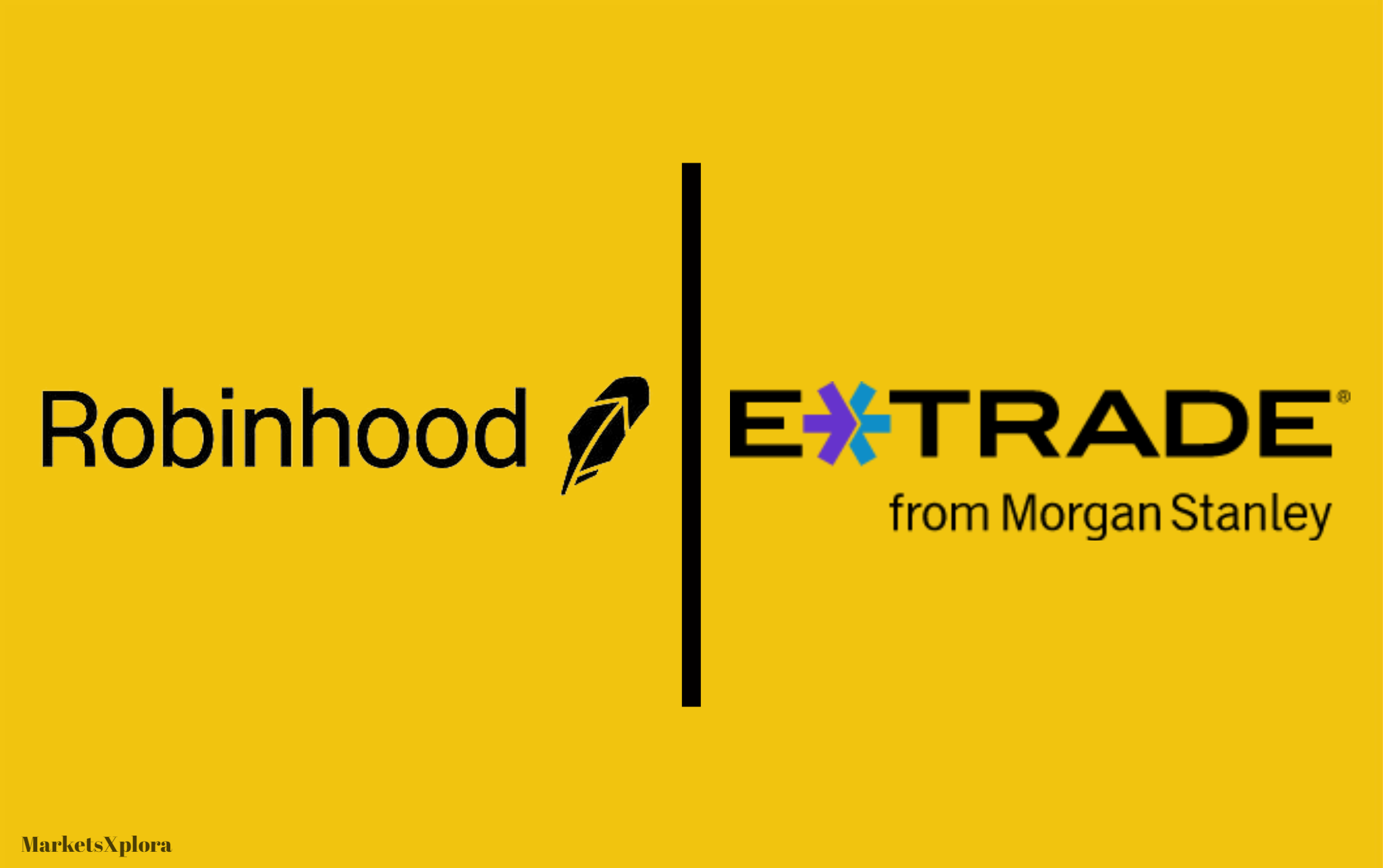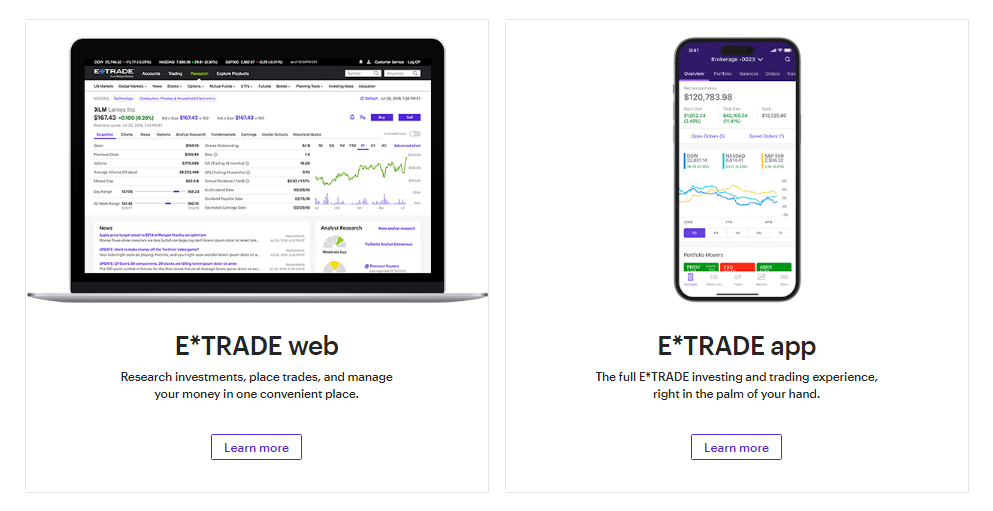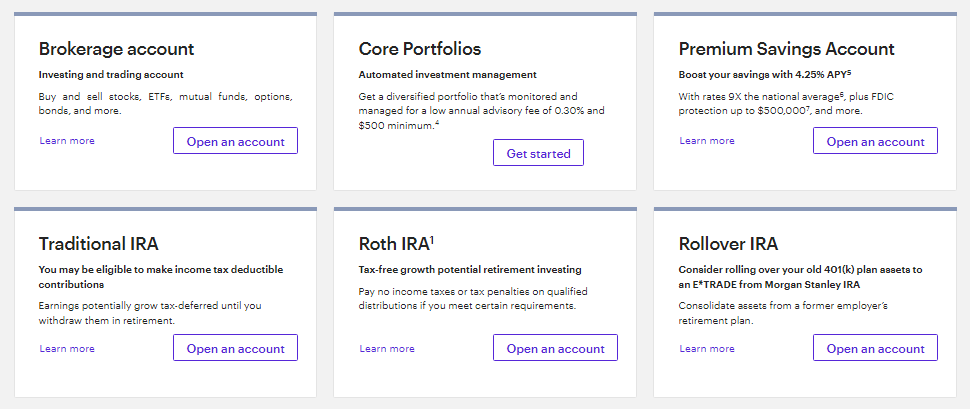
You’re here because investing your hard-earned money is a big decision, and you want to make sure you choose the right online broker that fits your specific needs and goals.
That’s why this comprehensive Robinhood vs ETrade comparison is a must-read. These two heavyweights have been battling it out for investors’ dollars, each bringing their own unique offerings to the table. And let’s be honest, picking the wrong broker could cost you big time in commissions, missed opportunities, or a frustrating user experience.
So which broker should you choose for your investing needs? In this article, we’ll go round-by-round, analyzing every aspect that should matter to you:
- Account types and requirements to get in the game
- Full scope of trading capabilities across different assets
- User experience comparing platform design and mobile apps
- Pricing, fees, and commissions that can drain your profits
- Security measures to protect your hard-earned capital
- Customer support and education to keep leveling up your skills
Let’s get started!
Robinhood vs ETrade: Quick Overview
| Comparison Point |  |
 |
|---|---|---|
| Year Founded | 2013 | 1982 |
| Founders/CEO | Vlad Tenev, Baiju Bhatt | Morgan Stanley (founded as subsidiary), Michael Pizzi (CEO) |
| Headquarters | Menlo Park, California | Arlington, Virginia |
| Company Type | Financial Technology Startup | Online Brokerage Firm |
| Regulated By | FINRA, SEC | FINRA, SEC |
| Account Minimum | $0 | $500 for brokerage accounts |
| Key Features | Commission-free trades, fractional shares, user-friendly app | Wide range of investment products, advanced trading tools, advisory services |
User Interface and Experience

- Platform Design & Navigation: Robinhood is known for its user-friendly, minimalist interface that’s easy to navigate, especially for beginners. ETrade’s platform has a more traditional, feature-rich design that may take some time to get accustomed to.
- Charting & Technical Analysis: E*Trade offers robust charting capabilities with advanced technical analysis tools, making it better suited for active traders. Robinhood’s charting tools are more basic, focusing on essential charts and indicators.
- Research & Educational Resources: ETrade provides extensive research and educational materials, including analyst reports, screeners, and educational content. Robinhood has a more limited selection of resources, primarily focused on beginner-friendly content.
- Mobile App: Both platforms have highly-rated mobile apps, but Robinhood’s app is often praised for its simplicity and ease of use, while E*Trade’s app offers more features and tools for advanced traders.
- Customization & Personalization: E*Trade allows users to customize their trading layout, watchlists, and other preferences to a greater extent. Robinhood’s customization options are more limited, reflecting its streamlined approach.
Fees and Pricing
- Commission Fees: Robinhood pioneered commission-free trading for stocks, ETFs, and options, while E*Trade charges commissions for certain trades (e.g., $0.65 per options contract).
- Account Fees: Robinhood does not charge any account fees, while ETrade charges inactivity fees, maintenance fees, and other account-related fees for certain account types and balances.
- Other Fees: Both platforms may charge fees for items like account transfers, wire transfers, and regulatory fees, but the specific fees and amounts can vary.
- Advisory Fees: E*Trade offers advisory services with associated fees, while Robinhood does not currently have any advisory offerings.
Security and Regulation
- Data Encryption & Cybersecurity: Both Robinhood and ETrade employ industry-standard data encryption and cybersecurity measures to protect user information and accounts. However, ETrade, being a more established and larger firm, may have more robust security protocols and resources.
- Regulatory Compliance: As registered broker-dealers, both platforms are subject to regulatory oversight by entities like FINRA and the SEC, ensuring compliance with relevant laws and regulations.
- Investor Protection: Robinhood and E*Trade accounts are covered by SIPC (Securities Investor Protection Corporation) insurance, which protects up to $500,000 (including $250,000 for cash claims) in case of broker failure.
- Authentication & Safeguards: ETrade offers advanced security features like two-factor authentication, voice recognition, and account safeguards. Robinhood also provides two-factor authentication but may have fewer additional safeguards compared to ETrade.
Customer Support
- Support Channels: E*Trade offers multiple support channels, including phone, email, chat, and in-person support at branch locations. Robinhood primarily provides support via email and in-app chat, with limited phone support.
- Responsiveness & Quality: E*Trade is generally praised for its responsive and knowledgeable customer support, particularly for its phone and in-person support. Robinhood’s support has received mixed reviews, with some users citing delays and limited assistance.
- User Reviews & Feedback: E*Trade tends to receive more positive user reviews and feedback for its customer service compared to Robinhood, which has faced criticism for inadequate support, especially during periods of high trading volumes or system outages.
- Educational Resources: E*Trade offers a wealth of educational resources, including webinars, articles, and video tutorials, to help customers improve their investing knowledge. Robinhood’s educational offerings are more limited, primarily catering to beginner-level investors.
Specialized Features and Offerings
Robinhood
- Cash Management Account: Robinhood offers a cash management account that includes a debit card and the ability to earn interest on uninvested cash balances, providing a pseudo-banking experience.
- Recurring Investments: Robinhood’s recurring investment feature allows users to automatically invest a set amount on a regular schedule, including the ability to purchase fractional shares of stocks and ETFs.
- Robinhood Gold: This premium subscription service provides access to margin trading, allowing users to borrow funds to increase their purchasing power, in addition to other benefits like professional research and higher instant deposits.
E*Trade
- Managed Accounts & Advisory Services: ETrade offers a range of managed portfolio solutions, including robo-advisory services and access to human financial advisors, catering to investors seeking professional guidance and management.
- Banking Services: In addition to brokerage accounts, ETrade provides banking services like checking and savings accounts, credit cards, and mortgages, allowing customers to consolidate their finances in one place.
- Retirement Planning Tools: E*Trade offers comprehensive retirement planning resources, including calculators, guides, and advice to help customers plan and save for their retirement goals.
- Circle Investing: This social investing platform, acquired by E*Trade, allows users to share investment ideas, follow others’ portfolios, and collaborate with like-minded investors.
User Profiles and Recommendations
Beginner Investors and Traders:
If I’m someone who enjoys the social aspect of investing and likes to collaborate with others, E*Trade’s Circle Investing platform could be very appealing to me. It allows me to connect with other investors, share investment ideas, and even follow the actual portfolios of traders I respect.
As a beginner, being able to see how more experienced investors allocate their capital across different stocks and strategies provides invaluable learning opportunities. I can analyze their portfolios, rationale, and outcomes to help shape my own investment approach.
Active Traders and Day Traders:
Even for an active trader like myself, Circle Investing could serve as a tool for sourcing new trade ideas from the community. I may discover potential setups I hadn’t previously considered based on the shared watchlists and insights of other nimble traders.
Long-term Investors and Retirement Savers:
For long-term investors, Circle’s portfolio mirroring feature is quite powerful – I can automatically replicate the portfolios of investors whose principles and styles resonate with my own. This could save me significant research time while ensuring my long-term holdings adhere to proven strategies.
Wealth Management and Advisory Clients:
And as a wealth management client, Circle may allow me to selectively follow the portfolios of advisors or professional money managers, giving me additional transparency into how my capital is being allocated if I opt for E*Trade’s managed account services.
The ability to interact with and learn from such a diverse community of investors through a social platform like Circle Investing sets E*Trade apart and provides value to investors at various experience levels.
Robinhood vs ETrade: Pros and Cons
| Pros | Cons |
|---|---|
| No commission fees for stock, ETF, and options trades | Limited investment products (no mutual funds, bonds, futures) |
| User-friendly, beginner-friendly platform and mobile app | Basic research and educational resources |
| Fractional share investing and recurring investment options | Lack of advanced trading tools and order types |
| No account minimums or inactivity fees | Limited customer support channels |
E*Trade:
| Pros | Cons |
|---|---|
| Wide range of investment products (stocks, ETFs, options, mutual funds, bonds, futures) | Commission fees for certain trades (e.g. options) |
| Robust trading platform with advanced tools and customization | Account minimums and fees for some account types |
| Extensive research and educational resources | Steeper learning curve for beginners |
| Managed account and advisory services available | Higher costs for premium services and advisory fees |
| Integrated banking and financial planning capabilities |
Conclusion – Which Broker Should You Choose?
When it comes down to choosing between Robinhood and ETrade, I can’t just go with my gut feeling. As an informed investor, I need to really spend time evaluating where I’m at in my investing journey and whatmy specific goals and needs are.
If I’m just starting out and Want the simplest, most affordable way to begin building basic portfolios of stocks and ETFs, Robinhood’s user-friendly app and commission-free trades could be the way to go for me. No account minimums or inactivity fees are also great for beginners.
However, if I consider myself an active trader who needs robust charting, diverse asset coverage like futures, advanced order types, and premium trading tools, then E*Trade’s more powerful platform would likely serve me better despite the trade commissions.
Or if I’m looking to not just trade, but to build long-term wealth for myself and my family while taking advantage of professional financial advice, E*Trade’s wide range of accounts, advisory services, banking integration and retirement planning resources would probably provide the most comprehensive solution for my needs.
The key is spending the time upfront to get very clear on my investing goals, strategies, and experience level. From there, I can objectively weigh each platform’s capabilities against my personal priorities to determine which broker will put me on the ideal path to success. Taking shortcuts or guessing could end up costing me far more than I bargained for down the road.

